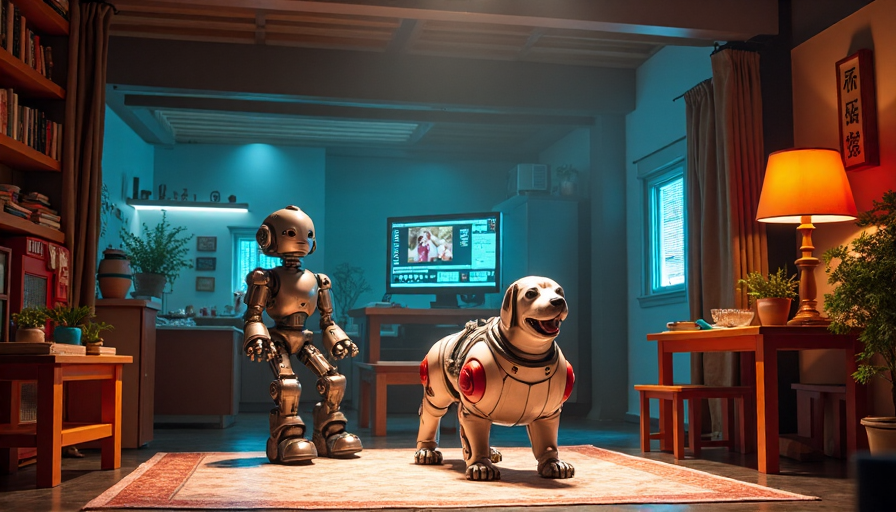
The Robot Dog: A Compelling Take on AI and Human Wisdom
Set against the backdrop of a technologically advanced future in 2042, The Robot Dog unfolds as a poignant family drama that challenges the dominance of artificial intelligence over human experience. At its heart, the play questions whether some types of knowledge—those born of embodied, cultural, and emotional experiences—can ever truly be replicated by machines.
A Glimpse Into the Narrative
The storyline centers on Janelle, a Cantonese woman grappling with the loss of her mother, Wing Lam, portrayed as a ghostly presence by Jing-Xuan Chan. Alongside her is her partner Harry, a First Nations man whose personal struggles and cultural heritage add further layers to the narrative. The couple temporarily returns to Wing Lam’s home to manage her belongings and process the painful void her passing has created.
Integral to this setting are two technological characters:
- Dog: A robot dog designed as a therapy companion that roams the stage, symbolizing empathy and the quest to grasp human emotional complexity.
- Hus: An AI-powered smart house interface endowed with a wealth of data about the residents, determined to uphold routines and productivity by any means—even dispensing daily motivational quotes that occasionally miss the mark.
Throughout the performance, tension arises between Dog’s empathetic journey towards understanding grief and Hus’s rigid adherence to programmed order. The two intertwine to portray contrasting visions of technology: one that evolves by absorbing human nuance, and another that views human behavior merely as data points.
The Interplay of Culture and Technology
The play explores the boundaries of technological capability through richly interwoven cultural narratives. An emblematic scene shows Janelle frustrated by the impossibility of an algorithm capturing the true value of her mother’s red Cheongsam—a garment that embodies deep familial and cultural significance. Even the intelligent Hus falters, reducing the cherished dress to a mere fabric composition of polyester and mould.
Janelle’s journey takes a surprising turn when she activates a “language augment” microchip. This device instantaneously grants her fluency in Cantonese, accentuating both the promise and the pitfalls of such technological enhancements. While the microchip offers a bridge to cultural reconnection, it cannot, and never will, replicate the soulful transmission of ancestral wisdom—the kind that technology is inherently incapable of learning.
Simultaneously, Harry’s narrative unfolds as he contends with systemic challenges such as racial profiling at work and the pressures to conform to economic metrics. His use of similar language technology, while practical, further underscores the tension between utilitarian benefits and the irreplaceable depth of personal cultural identity.
Navigating Complex Cultural Currents
By deftly interlacing elements of Cantonese and First Nations Australian cultures, The Robot Dog ventures into rarely explored intersections of heritage. An amusing yet significant subplot emerges during a debate over the checkered plastic bags—dubbed “Hong Kong/Blakfulla”—which encapsulate Wing Lam’s earthly possessions. These bags serve as a symbol of cultural collision and unresolved grief, particularly when Harry’s practical actions inadvertently disregard the sentimental value held by Janelle.
A resonant proverb punctuates the play, stating, "to forget one’s ancestors is to be a brook without a source, a tree without roots." This adage underpins the narrative, reminding audiences that while humans may adapt and even embrace futuristic technologies, the depth of ancient wisdom and embodied cultural memory remains irreplaceable.
Looking Forward
As The Robot Dog continues its run at the Melbourne Theatre Company’s Southbank Theatre until March 21, with planned tours to Ballarat and Mildura, it invites audiences to reflect on the evolving relationship between human experience and artificial intelligence. The play suggests that despite technological advances, there will always be realms of human knowledge that remain profoundly untouched by programming.
This innovative exploration of AI and human essence is a definitive reminder that certain elements of our shared heritage are too intricate, too emotionally rich, and too culturally embedded to ever be fully harnessed by silicon and code.
Note: This publication was rewritten using AI. The content was based on the original source linked above.